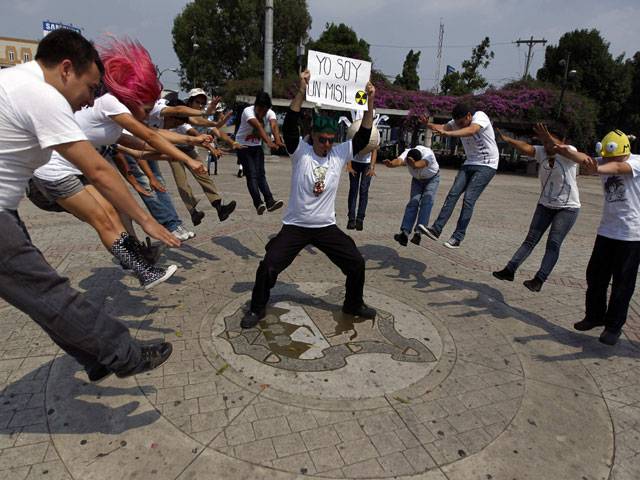TOKYO (AFP) - US Secretary of State John Kerry pushed a message of dialogue with North Korea at the end of an Asia tour on Monday, as Pyongyang kept the world guessing over an expected missile launch.
The North has a habit of linking high-profile military tests with key dates, and expectations had been high of a mid-range missile test to coincide with Monday’s celebrations marking the birth of its late founding leader Kim Il-Sung.
But unlike the centennial birth anniversary last year, there was no muscular military parade through the centre of Pyongyang and officials in Seoul said the “missile watch” could drag on for days.
North Korea and the soaring tensions on the Korean peninsula dominated Kerry’s whirlwind tour of South Korea, China and Japan, with the top US diplomat stressing a willingness to “reach out” to Pyongyang.
Kerry, who met with Japan’s Prime Minister Shinzo Abe on the final leg of his trip in Tokyo on Monday, said Washington was open to “authentic and credible” negotiations.
“But the burden is on Pyongyang,” he said, adding that the North had to take “meaningful steps” to show it would honour past commitments.
Already assured of the support of US allies South Korea and Japan, Kerry said a commitment he received from China to work together to reduce tensions showed the world was speaking with one voice.
“One thing is certain: we are united. There can be no confusion on this point,” he said.
The Korean peninsula has been in a state of heightened military tension since the North carried out its third nuclear test in February.
Incensed by fresh UN sanctions and joint South Korea-US military exercises, Pyongyang has spent weeks issuing blistering threats of missile strikes and nuclear war.
Washington insists that the “six-party” talks on denuclearisation - which take in both Koreas, Japan, Russia, China and the United States - is the only forum at which it will sit down with Pyongyang.
“It seems Kerry on this trip was focused on defusing the immediate tensions,” Yang Moo-Jin, a professor at the University of North Korean Studies in Seoul told AFP.
“The offer of dialogue was very general and conditional, but this was his opening bid. A lot will depend on how the North responds,” Yang said.
In Seoul, Kerry had given Washington’s public blessing to peace overtures made by South Korea’s new president, Park Geun-Hye, who in recent days has signalled the need to open a dialogue and “listen to what North Korea thinks”.
But the North rejected her proposals as a “crafty trick” to conceal Seoul’s aggressive intentions.
“It is very regrettable that the North dismissed our offer,” the South’s Unification Ministry said Monday, labelling Pyongyang’s response “totally incomprehensible”.
North Korea’s current leader, Kim Il-Sung’s grandson Kim Jong-Un, opened Monday’s anniversary events with a visit to the Pyongyang mausoleum housing the embalmed bodies of his grandfather and his father Kim Jong-Il.
State television interspersed musical programming with patriotic films, documentaries on the life of Kim Il-Sung and footage of Korean soldiers honing their martial arts skills.
The missiles mobilised by the North for a possible launch are reported to be untested Musudan models with an estimated range of up to 4,000 kilometres (2,485 miles).
That would cover any target in South Korea and Japan, and possibly even US military bases on the Pacific island of Guam.
South Korean and US forces have been on a heightened state of alert for days, and Japan has deployed Patriot anti-missile systems around Tokyo and promised to shoot down any missile deemed to be a threat.
South Korean Defence Ministry spokesman Kim Min-Seok said the alert would remain in force even in the absence of a missile launch on Monday.
“We believe the situation may drag on for quite a while,” Kim said.
Friday, April 19, 2024
US urges talks as North Korea keeps missile card close

President calls for meaningful dialogue to end polarisation
April 19, 2024
KP minister briefed on issues about sales tax on services
April 19, 2024
64th anniversary of freedom fighter Mirzali Khan marked
April 19, 2024
893,000 students appear in SSC exams in KP
April 19, 2024
Hepatitis Challenge
April 18, 2024
IMF Predictions
April 18, 2024
Wheat War
April 18, 2024
Rail Revival
April 17, 2024
Addressing Climate Change
April 17, 2024
Justice denied
April 18, 2024
AI dilemmas unveiled
April 18, 2024
Tax tangle
April 18, 2024
Workforce inequality
April 17, 2024
New partnerships
April 17, 2024
ePaper - Nawaiwaqt
Advertisement
Nawaiwaqt Group | Copyright © 2024





